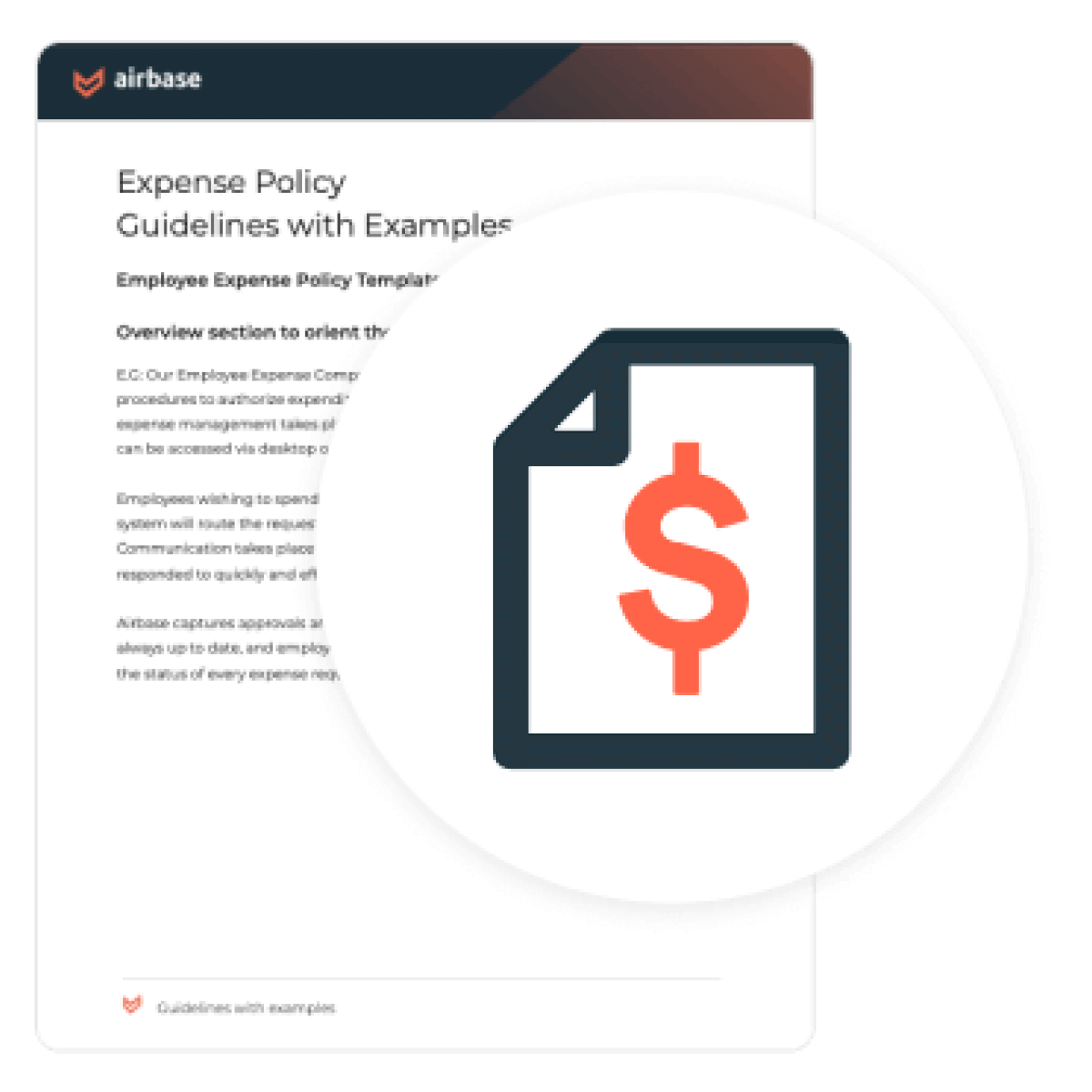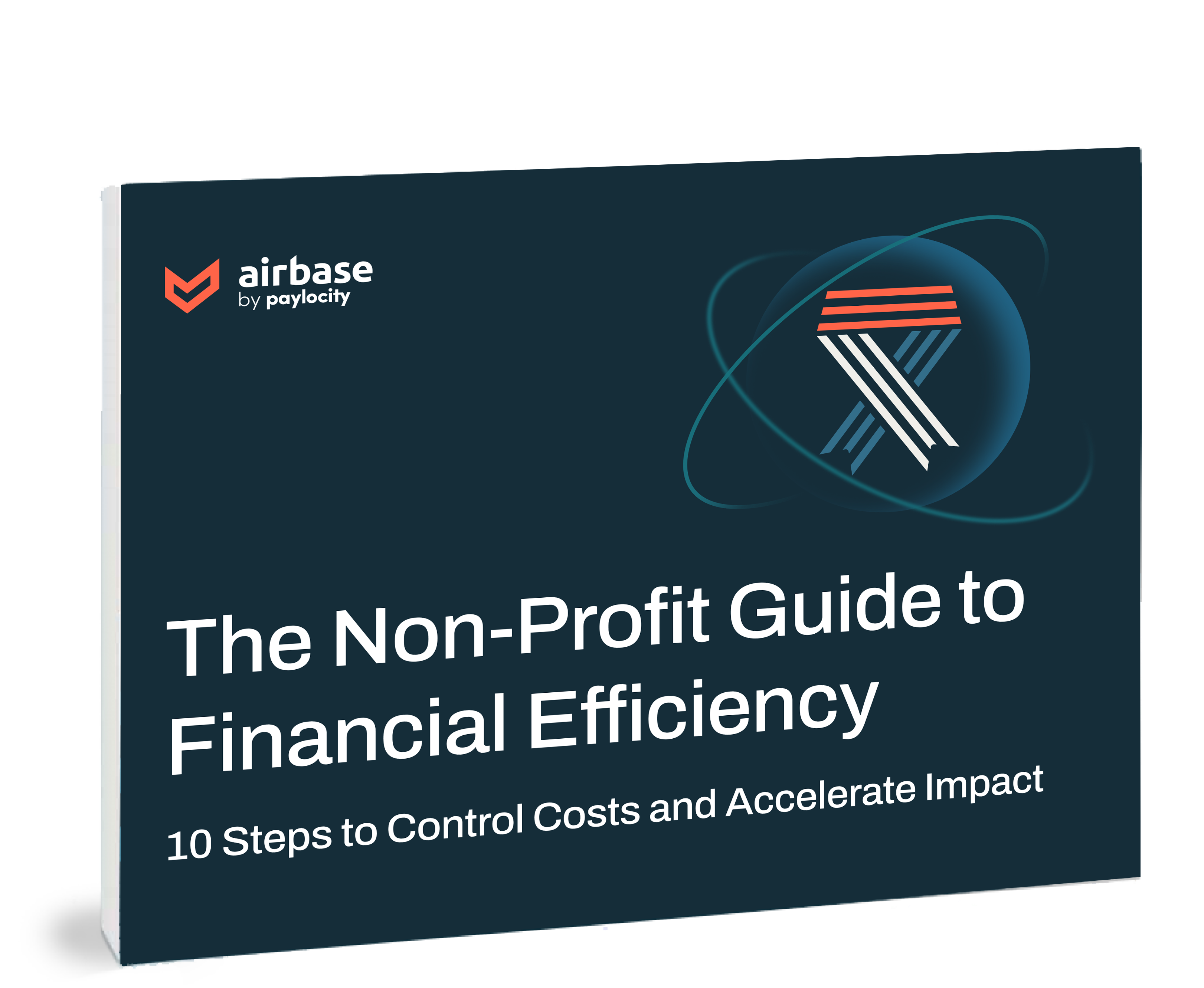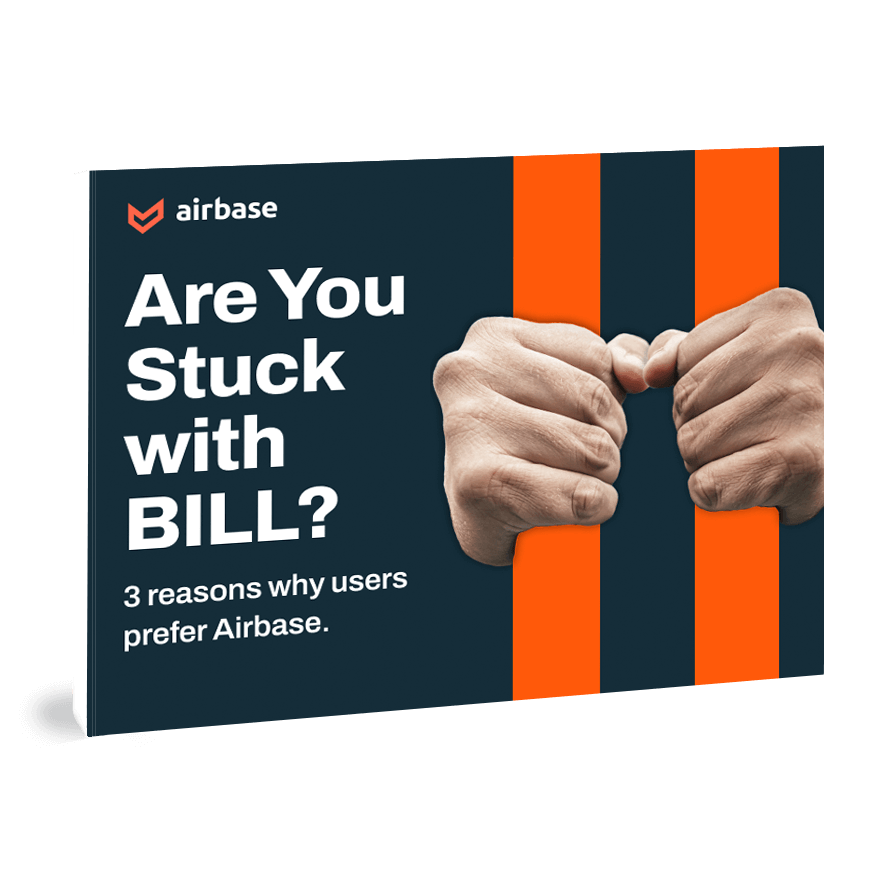Business Expense Policy Template with Examples
Employee Expense Policy Template and Examples

Expense Policy Guidelines: Overview.
E.G: Our Employee Expense Company Policy outlines work-related expenses and sets procedures to authorize expenditure and request reimbursement when required. All expense management takes place in Airbase’s spend management platform, which can be accessed via desktop or mobile app.
Employees wishing to spend company money submit a request in Airbase, and the system will route the request to the appropriate approver, or set of approvers. Communication takes place in Slack or email so that your purchase needs are responded to quickly and efficiently.
Airbase captures approvals and transactions in real time, so financial information is always up to date, and employees and finance team members have clear visibility into the status of every expense request.
01 
State the purpose.
The purpose of this policy.
E.G. This expense policy example outlined applies to all employees who spend money on work-related activities. We created our Employee Expense Policy to provide clear guidelines on how employees can make work-related purchases. Requests for expenses are handled through Airbase, which applies automated rule-based policies to ensure compliance, and to route all requests through the correct approval chain. This reduces the burden on employees to follow complex procedures and policies. An overview of our policy is provided below.
Employee expense categories.
Our expense policy covers two types of expenses:
- Expenses the company pays for directly.
- Expenses that employees pay themselves, then submit for reimbursement.
02 
Specify policies regarding payment type.
E.G. Airbase accommodates all payment types: virtual cards, physical corporate cards, reimbursements, and purchase orders. Employees are encouraged to use virtual cards for recurring or single vendor expenses that can be paid with a card. Physical card purchases should be restricted to in-person purchases only. All other requests should be made as a purchase order.
Note: When creating policies regarding payment type, refer to the Policy considerations and best practices for payment method selection ebook.
03 
Specify receipt requirements.
E.G. All purchases over a threshold of <amount> require a receipt. Receipts are uploaded into Airbase at the time of purchase and will be attached to your specific transaction. Physical receipts can be uploaded directly to the mobile app by taking a photo with your mobile device. Invoices can be uploaded, and Airbase’s OCR technology will scan for relevant details.
04 
Specify procedures.
Expense procedures.
E.G. Expenses the company pays for directly: In Airbase, submit a request for an expense, either one-time or recurring. Airbase automatically routes your request to the correct approver(s), and flags out-of-policy requests based on our rule-based policies, so employees simply fill out the required fields. You will be asked to supply a category (from a drop-down menu) and tags for the purchase. Consult your manager or the accounting team at the time of request if you are not sure how to categorize the expense. Some of your expenses will be automatically categorized.
E.G. Expenses for reimbursement: Request a reimbursement through Airbase by completing the required fields and attaching any related receipt(s) if required. Airbase will only accept requests for reimbursement for items that are on our eligible expenses lists (see below). Receipts can be uploaded into Airbase, and OCR technology will pull the relevant details. A reimbursement request is automatically routed to the correct approver(s). Once approved, funds are automatically deposited into your bank account, based on the banking information you provide within Airbase. Requests for reimbursement can occur at any time and will be processed immediately.
05 
Specify acceptable travel expenses.
Covered expenses upon approval.
Travel expenses.
E.G. Travel expenses refer to all transportation and accommodation costs an employee has while traveling for business, including:
- Accommodation.
- Transportation fares, by air, rail, or ship.
- Cab or rideshare charges.
- Legally required documentation, such as travel visas.
- Rental cars and gasoline.
- Required medical expenses, such as vaccinations.
- Meals (breakfast, lunch, and dinner) to a maximum of <amount> per day.
- Other approved expenses as required for the trip, such as materials for presentations.
06 
Identify partnerships and how to access.
Partner relationships.
E.G. We want all employees to have a positive, safe experience while traveling, but we also want to avoid unnecessary costs. To obtain maximum value for our travel dollars, we have partnered with a number of accommodation and transportation providers. Please book with these services whenever possible.
<list>
Travel should be booked in ___________ class, unless there is a valid reason to upgrade. Please work with your manager when making travel arrangements.
07 
Specify acceptable business expenses.
Business expenses.
E.G. We want to make sure that all employees have what they need to do their jobs. Approved expenses may include software subscriptions and office supplies, as well as expenses related to business entertainment, such as client dinners. If you have specific questions on what constitutes a business expense, please contact your manager.
08 
Identify any special expense or benefits programs.
Expenses for remote workers.
E.G. It’s important that remote workers are comfortable and productive at home. We cover expenses related to creating a remote work environment, such as:
- Office supplies to a maximum of <amount>.
- Co-working space fees to a maximum of <amount>.
- Computer equipment and software to a maximum of <amount>.
- Internet access charges to a maximum of <amount>.
- Telephone landline charges to a maximum of <amount>.
- Stipends for special benefits, such as meals during virtual events.
Benefits that the company will pay for:
E.G. We provide additional benefits to our employees. Requests for these benefits follow the same procedures:
- Gym memberships to a maximum of <amount>.
- Mobile phone expenses to a maximum of <amount>
- Wellness programs to a maximum of <amount>.
- Childcare expenses to a maximum of <amount>
- Continuing education and training expenses to a maximum of <amount>.
09 
Identify expenses the company will not pay for.
Ineligible expenses.
E.G. Employees are responsible for the following:
- Personal expenses, including utilities and mortgage payments for remote workers.
- Personal services (e.g., beauty treatments while traveling).
- Personal purchases, such as souvenirs, gifts, or clothing.
- Upgrades to transportation or accommodation, unless approved by manager.
- Any fines as the result of travel or while driving a company vehicle.
- Personal subscriptions.
- Personal travel, including side trips while on a business trip.
- Unauthorized business meetings.
10 
Identify who to contact with questions.
E.G. Consult your manager first for any questions regarding this policy guide. The HR team is responsible for maintaining and updating these policies. Please contact <email> if you are unable to resolve your question with your manager.
Recommended additional reading:
 Jira Integration – Streamline Your Workflows
Jira Integration – Streamline Your Workflows  Ironclad Integration – Simplify Legal Operations
Ironclad Integration – Simplify Legal Operations  Asana
Asana 



